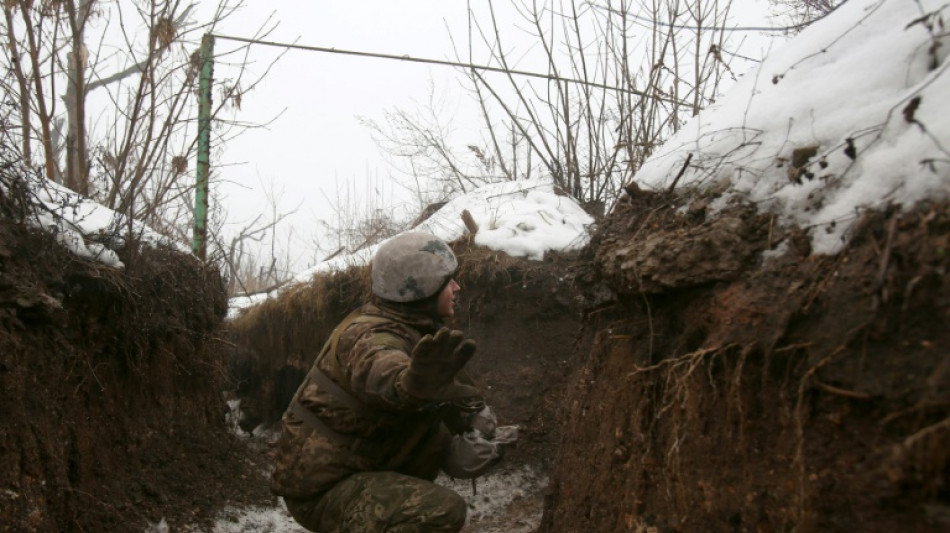

Russia wins Chinese backing in showdown over Ukraine
Russia won China's backing in its showdown with the West over Ukraine on Friday, as Beijing agreed with Moscow that the US-led NATO military alliance should not admit new members.
The demand for NATO to stop expanding came after a meeting between Russian President Vladimir Putin and Chinese counterpart Xi Jinping in Beijing that saw Putin hail the two countries' "dignified relationship".
In a long strategy document, Moscow and Beijing hit out at what they said was Washington's destabilising role in global security.
"The parties oppose the further expansion of NATO and call on the North Atlantic Alliance to abandon the ideological approaches of the Cold War era," the document read, urging respect for the "sovereignty, security and interests of other countries."
The call echoes demands from Russia that have been at the centre of weeks of intensive negotiations between Moscow and the West, under the shadow of a potential conflict.
Western capitals have accused Russia of amassing some 100,000 troops on the borders of pro-Western Ukraine in preparation for an invasion and have vowed to impose devastating sanctions on Moscow if it attacks.
German Chancellor Olaf Scholz was the latest European leader to announce a visit to the region on Friday, saying he would go to Ukraine on February 14 and Russia the next day.
- 'Delusional' false flag claims -
French President Emmanuel Macron will visit Moscow on Monday and Kyiv on Tuesday for talks with his Russian and Ukrainian counterparts.
Putin's meeting with Xi -- hours ahead of the opening ceremony of the Winter Olympic Games -- came after the United States said it had evidence of a plan by Moscow to film a fake Ukrainian attack on Russians to justify an attack on its neighbour.
Pentagon spokesperson John Kirby said the US had "information that the Russians are likely to want to fabricate a pretext for an invasion", but did not provide evidence.
Russia, which has repeatedly denied any invasion plans, said the US claims were absurd.
"The delusional nature of such fabrications -- and there are more and more of them every day -- is obvious," Foreign Minister Sergei Lavrov said in televised remarks.
Washington's claim came on the back of visits from European leaders to shore up support for Kyiv, including from British Prime Minister Boris Johnson and Turkish President Recep Tayyip Erdogan.
Ukraine's Foreign Minister Dmytro Kuleba on Friday welcomed the displays of support, saying they had prevented Russia from "further aggravating the security situation".
- 'Intimidation strategy' -
"Our partners believe in Ukraine and that means Moscow's intimidation strategy is not working. Russia has lost this round," Kuleba said.
During Erdogan's visit Thursday he and Ukrainian President Volodymyr Zelensky signed an agreement expanding the production of parts in Ukraine for a Turkish combat drone whose sale to Kyiv has angered Moscow.
Erdogan has tried to position Turkey, which is a member of NATO, as a neutral mediator close to both Moscow and Kyiv.
Following his trip, Erdogan accused the West of making the crisis "worse".
"Unfortunately, the West until now has not made any contribution to resolving this issue," he said in comments published by local media Friday.
"They are only making things worse," Erdogan said, adding that Joe Biden "has not yet been able to demonstrate a positive approach".
Russia's relationship with the West was severely damaged in 2014 when it annexed the Crimean peninsula from Ukraine and threw its political weight behind armed separatists in the east the country.
Nearly eight years of fighting between Kyiv and the pro-Moscow fighters has cost more than 13,000 lives and seen the West and Russia exchange waves of tit-for-tat sanctions.
In the most recent diplomatic flare-up, Putin has demanded guarantees that Ukraine will not join NATO and has implicitly threatened the former Soviet state with the massive military build-up.
These tensions have been aggravated by plans for joint military exercises between Russia and neighbouring Belarus, where Washington claims Moscow is preparing to send 30,000 troops.
F.Bellezza--LDdC



